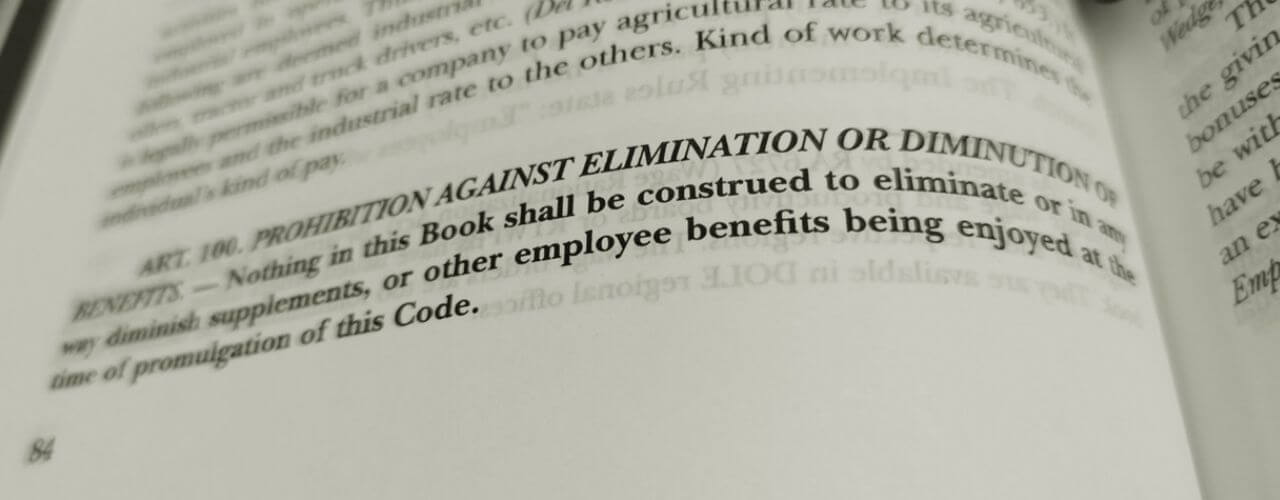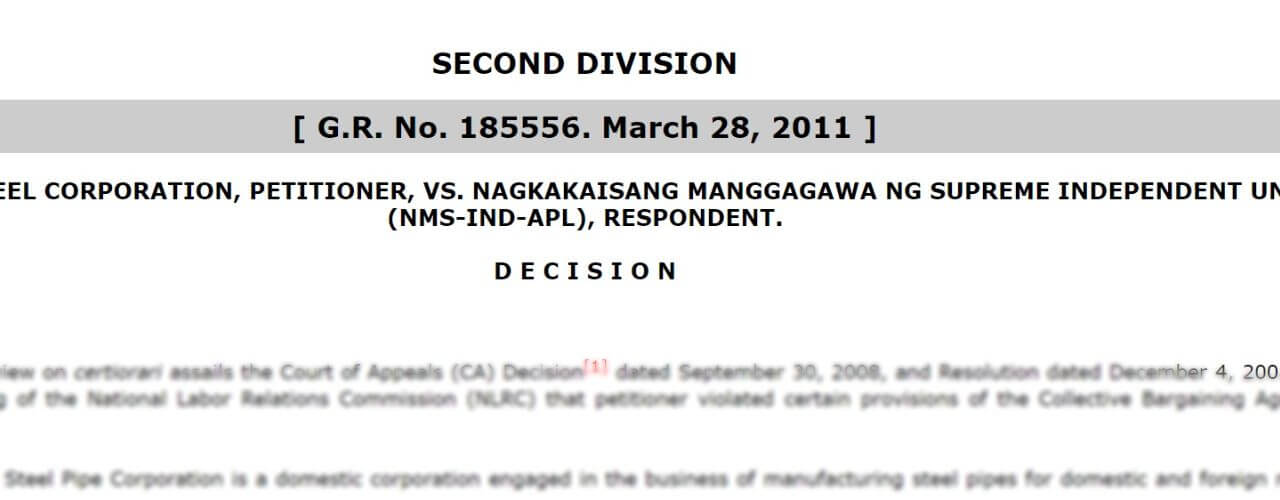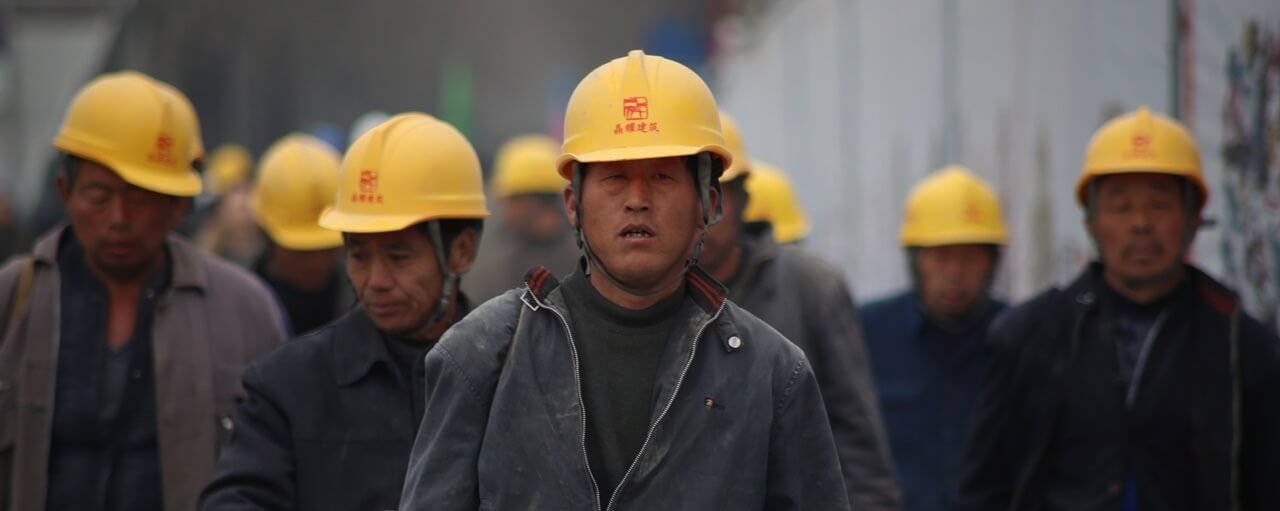
Table of Contents
Diminution Philippines: What is it?
Diminution in the Philippines refers to a reduction of rank, pay, status or benefits. It may happen in a Demotion or Transfer.
Diminution is a frequently cited ground in Labor Cases such as Constructive Dismissal – and it is very important for an HR to understand what it is. This will help you work better with your Philippine Labor Lawyer when you defend a case.

In this article, we’ll discuss:
- What is the Law on Diminution in the Philippines?
- When does Diminution happen?
- Diminution in Benefits, Rank and Pay
- Diminution vs Demotion
- The Labor Case Process and Awards
The Law and Diminution in the Philippines
When Diminution is mentioned in court cases, Art 100 of the Philippine Labor Code is often cited. It reads:

Art. 100. Prohibition against elimination or diminution of benefits. Nothing in this Book shall be construed to eliminate or in any way diminish supplements, or other employee benefits being enjoyed at the time of promulgation of this Code.
However, Diminution in Philippine law really relies more on what the Supreme Court has written in its Decisions (the above article is mostly just discussing the non-diminution of benefits at the time of the promulgation of the Labor Code.)
These Supreme Court Decisions are very important in understanding Diminution.
We’ll go through these Decisions here so that you can figure out how to best protect your company when faced with a Constructive Dismissal case.
Hopefully, it will also help you work with your Philippine Labor Lawyer more efficiently.
When does Diminution in the Philippines happen?
Diminution is when less pay and fewer benefits are received than expected and it happens when there is an express policy, a written contract, or [when the benefit] has ripened into company practice [G.R.200010].

Let’s break that down.
Say a newly hired supervisor was assigned to a rank-and-file position due to management dissatisfaction with his performance.
Was there Diminution?
Yes, there was Diminution because his rank was reduced from a supervisor position to a rank-and-file position, which is in opposition to his hiring contract.
Is this enough for an employee to file a case?
It depends on the facts.
As per jurisprudence, there are actual requirements to notify and go through due process when there is a lawful demotion. What was done, how it was done, and the exact facts must be discussed with your Labor Lawyer to see how to defend the company if a disgruntled employee files a case on these grounds.
Let’s go through a few more examples of Diminution in the Philippines – this time with regard to benefits
Diminution Philippines: Reduction of Benefits
Diminution of benefits can occur when a company benefit is no longer given to employees. A benefit may be something stated in your company policy – or it may be a company practice that has ripened into a benefit.

Let’s take a look at a case the Supreme Court granted in favor of the company so that you know the considerations involved.
In G.R. 185556, a Wage Order granted a Php 15 COLA increase to non-minimum wage earners.
The company mistakenly applied it to all employees at first, but then stopped this on July 24, 2005.
Employees stated that this should be applied to all employees because the company had done that at first, and so removing it was a diminution on a company practice that had already ripened into a benefit.
The Supreme Court disagreed that this had already ripened into a benefit.
For a company practice to ripen into a benefit, the court stated that:
(1) the grant or benefit is founded on a policy or has ripened into practice over a long period of time
(2) the practice is consistent and deliberate
(3) the practice is not due to error in the construction or application of a doubtful or difficult question of law; and
(4) the diminution or discontinuance is done unilaterally by the employer.

In this case, the court noted that the practice of giving an increase to all employees only lasted a year. It cannot have been considered to have been practiced over a long period of time.
So, in this case, the Diminution of Benefits did not happen.
Another case decided in favor of a company was the case of employee Rollette Prudente in G.R 200010.
In this case, the company Home Credit Mutual Building gave Rollette her first service vehicle.
Then, the company granted her request for a second service vehicle but asked her to pay any amount over Php 660,000.
When Rollette decided to buy a 3rd service vehicle, the company required her to shoulder more than 40% of the purchase.
Rollette filed a case stating that this was the diminution of benefit.

However, the Supreme Court did not find any proof that it was part of her hiring package or contract.
In addition, the court found that the car plan was a company practice but not as to the non-participation aspect – in other words, that the company paid for the full cost of the car had not yet ripened into a benefit because it was not consistent and deliberate.
Diminution Philippines: Reduction of Rank

Diminution of Pay can also sometimes lead to litigation, as in the case of G.R. 195297 Coca Cola Bottlers vs ICCPELU.
In this case Coca Cola Bottlers had removed Saturday work due to business necessity.
ICCPELU contended that removing Saturday work was against the Collective Bargaining Agreement. The union contended that Saturday work had ripened into company practice, that the union could compel Coca Cola Bottlers to give Saturday work, that the removal of Saturday worked was a Diminution of Pay.
After scrutinizing the CBA, The Supreme Court disagreed with the union’s interpretation.
The Court said Saturday work was optional and that it was in the nature of overtime work.
The Court pointed to the fact that Coca Cola Bottlers gave Overtime Pay for this.

In addition, the Court stated that there is no need to give Overtime pay if the Saturday work is part of the regular workweek.
Pertinent to the diminution argument, the Court pointed out that the removal of Saturday work was not a diminution of benefits or pay.
It said that reducing the 50% additional pay would have been a diminution of benefit – but not the removal of Saturday work itself.
The Court then decided in favor of Coca Cola Bottlers and the union.
As an HR, it is very important to think about how a contract provision can be read.
And it is always, always best to consult with a Philippine Labor Lawyer when changing work times or benefits.
It will save you trouble in the long run.
Diminution Philippines and Demotion
As you can see above section on Diminution of Rank, Diminution in the Philippines can sometimes be determined to be an Illegal Demotion.

If Diminution and Demotion both have a reduction in rank, pay, and benefits, what is the difference between them?
What makes a Demotion valid or invalid?
And – can we even Demote under the law?
You would be right to wonder.
An Illegal Demotion in the Philippines can lead to cases for Constructive Dismissal – so when considering Demoting an Employee follow the guidelines:
- There should be a valid Cause for a Philippine Demotion
- The Demotion should follow the Twin Notice Rule
For real-life examples and a thorough discussion, take a look at our article on Demotion in the Philippines.
What is the process followed in a Labor Case?
When an employee files a case at the NLRC, you can expect to go through Mediation, the Labor Arbitrar, Appeal, the Court of Appeals and the Supreme Court, if it gets that far.

This can go on for 15 years in some situations.
In many cases, it’s best to try to settle but be prepared to fight it out.
Gather as much information as you can.
Remember the main points of the examples of Philippine Diminution cases – and prepare all the information.
Also, contact a Labor Lawyer early so that he can support you and so that he has ample time to create a strong and detailed response.
Labor cases are often dropped by employees because they don’t really have grounds, they don’t realize how much money it takes, or they were unprepared for how long the case would be.
A Labor case from SEnA to a final decision can take about a year.

A Labor case starts with mediation hearings, in which an employee and employer can resolve things without a case. You may go to several mediation hearings.
If this fails, position papers will be submitted. It is really important for position papers to be complete, which is why you need to contact a Labor Lawyer at the start – it’s harder to add evidence later.
Then there may be the submissions of Responses and Rejoinders.
There will also be the presentation of evidence and witnesses.
This is just the start, because cases may be appealed to the court of Appeals or the Supreme Court, in which case, you may be looking at 15 years or so as I mentioned up top
What are the Penalties for Labor Cases?

Labor cases have several penalties.
If you are defending a case for may be part of a case for forced resignation (or Constructive Dismissal in legalese), several of the same penalties apply:
- Back wages
- Reinstatement
- Separation Pay
- Moral Damages
- Attorney’s Fees for Bad Faith
These are the major awards although there are others such as Exemplary Damages and such.
Let’s go through them one by one.
Reinstatement is awarded for involuntary resignation when the court believes that the employee and the employer can still work together.
Reinstatement is when the employee resumes his work with the company at the same pay, benefits and responsibilities he previously had.
However, if the court believes that there now exists strained relations between the 2 parties such that they cannot work together, the court can instead direct the payment of separation pay.
G.R.188269 is a good example of this.

A lower court recommended Reinstatement.
However, the Supreme Court ordered Separation Pay instead after determining that the demoted employee had been constructively dismissed – it thought that the employee and his employer could no longer work together because of their past history.
Separation Pay is awarded to an employee when forced dismissal occurred and the employee can no longer return to work with the company i.e. he becomes “separated”.
This happens when the relationship is too strained or when the company no longer has operations.
(Separation pay is also given for Retrenchment or Redundancy – in other words, when the employee is separated due to slow business, and not just as an award for a case won.)

Now, Moral Damages and Attorney’s fees may be awarded when there is bad faith.
Bad faith exists when the company acts in a dishonest manner.
For instance, in G.R. 202090, the company transferred employee Baya to punish him for the actions of his cooperative and for not switching his loyalty to a pro-company cooperative.
Thus, the Supreme Court awarded both Moral Damages and Attorney’s fees.
These are the major penalties for labor cases, although the court may decide to add other penalties as may be.

